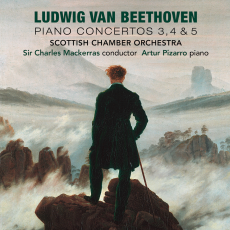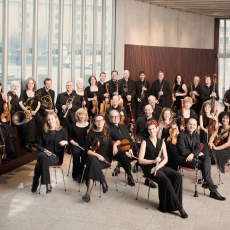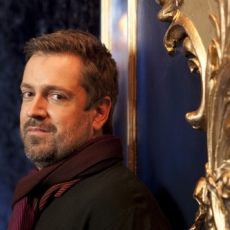Beethoven Piano Concertos 3, 4 & 5 - MusicWeb International
This set is a real treat which will bring many joys upon repeated listening. It is the result of a particularly happy collaboration between Pizarro, Mackerras and the SCO from November 2008. All had worked together before and the sessions were originally booked to record just the third and fourth concerto. Apparently, however, the recording went so successfully that they had ample time left over and so they decided to add the Emperor to the disc. There is a host of things to enjoy here, as well as one or two things to regret. For example, the blend between orchestra and soloist is rather too homogeneous so that at times, particularly in the Emperor, Pizarro's playing is subsumed into the general orchestral texture. It would have been nice to have had him placed further forward, though not all will agree with me. On to the joys, though.
The SCO have long been at the top of the collection of ensembles who play in "authentic" style on modern instruments and the sinuous opening of the third concerto benefits from the hint of period inflection it is given in the strings. The effect is to set up a dark, troubled atmosphere from the outset, hinting at danger lying just below the surface. The exposition as a whole carries tremendous weight so that the weighty chords before the soloist's entry feel like a thunderous full stop. In contrast to this Pizarro's playing is communicative and subtle rather than combative: the piano is no antagonist in this reading, instead he feels more like a searcher, a thoughtful enquirer. Not everyone will like this approach, but I felt it shed unexpected light on the movement. His style works particularly well for the Elysian peace of the slow movement. This, like all three of the slow movements, was kept moving at a fair pace so as to avoid becoming stodgy. The finale was lively and exciting, and the E major clarinet melody about 4 minutes in felt like a radiant breath of fresh air, beautifully played. The natural timpani also made a fantastic impression, particularly during, and just before, the C major canter of the final bars.
The opening of No. 4 shocked its first listeners and Pizarro's approach unsettled me too: he arpeggiates the first chord rather than playing it as one. This isn't an effect I liked, but it's not necessarily a bad thing to shake up our expectations of such familiar music. Once the opening phrase on the piano is left hanging, the orchestra appears to take it as a stimulus to carry on where the soloist left things, and the whole of the first movement feels like a response to those opening bars. It is here, more than in the other concertos, that we can most feel the sense of give and take, of an ongoing conversation. This is rare but very valuable in music like this. Even the cadenza seems to grow from the orchestral texture rather than existing to draw attention to itself. The slow movement is played truly con moto, with precision string playing that is clean and clipped. The finale bounces along joyfully and there is a pleasing rasp to the natural timpani and trumpets when they make their presence known.
The Emperor is the bonus work and that is evident from the sheer sense of exuberance in the music making. I don't think I've ever heard the first movement blaze with such exaltation as here, the trumpet fanfares at the end of the exposition sounding clear and focused, helping to crown the event. I wasn't quite so convinced by the speed with which Mackerras takes the adagio: this of all Beethoven's slow movements needs space to unfold gradually. Beautiful as the playing was, I couldn't wallow in this movement, which felt like it needed to be getting on somewhere. If that appeals, though, you'll find much to enjoy, and no-one could be unhappy with the finale which really bursts with joy right through to the final flourish.
Whatever your opinions on speeds or individual touches, this is a wonderful issue: the playing, the sheer musicianship and the sense of (yes!) fun come out again and again. Mackerras knows this music and this orchestra intimately and they produce playing of communicative skill that rivals the best. Pizarro is skilful without being showy and he fits admirably into the overall vision of the conductor. Everything is captured in Linn's typically exemplary sound which you don't need an SACD player to appreciate.


